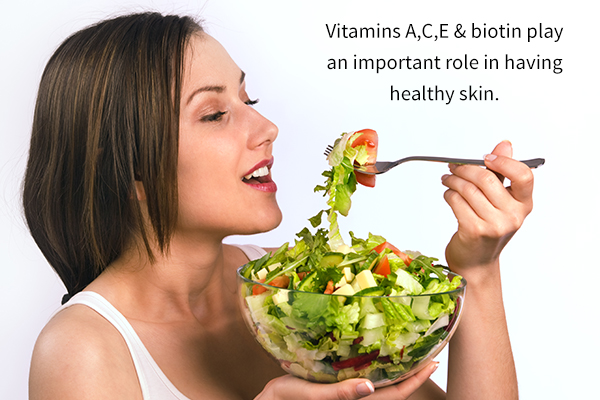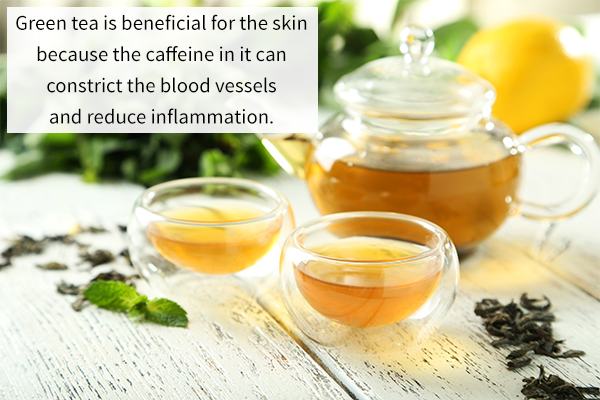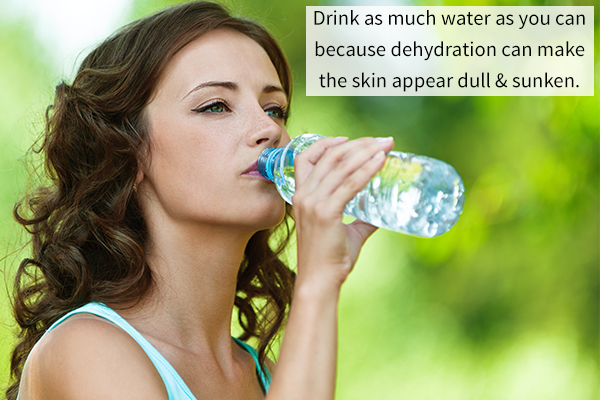In this article:
The struggle to get healthy, glowing, and flawless skin is as old as time, but still as relevant. However, there has been a lot of research and anecdotal evidence over the years that have added to our current understanding of how the skin works and how to keep it in the best of shape.

Skin care needs can vary from person to person, but there are some universal tips that can benefit everyone. This article talks about preventing and treating common skin problems through simple dietary and lifestyle changes.
Foods to Improve Skin Health
Foods high in antioxidants are fantastic for the skin because they fight against free radicals. Free radicals are caused by sun damage and any kind of stress to the body that lead to premature signs of aging.
Spinach, collard greens, broccoli, and kale are extremely high in antioxidants as far as green vegetables go. These dark leafy greens are also high in vitamin C, which is an antioxidant that helps produce high amounts of collagen to make the skin firmer and youthful.
Vitamins A, C, and E are all considered antioxidants. Dark leafy vegetables just happen to be high in these antioxidants. Other vegetables that contain this trifecta are bell peppers, peas, and tropical fruits such as mangoes and papayas.
Nutrients Needed for Glowing Skin

Many vitamins and minerals play a role in having healthy skin. Vitamins A, C, and E are all antioxidants that help combat the oxidative stress caused by free radicals. This oxidative stress is responsible for a great degree of cellular damage in the skin, which paves the way for premature aging.
Here are some of the most sought after skin-protective nutrients:
- Vitamin A is a fat-soluble vitamin and is also a known retinoid, which can help protect against skin damage and inflammation. Retinol is a big buzzword in the skincare world because it can help reduce fine lines and increase collagen production. Collagen is a structural protein that gives your skin its firmness and elasticity. (1)
- Vitamin E is also a fat-soluble vitamin that helps reduce and repair damage in fat-based cell membranes. Thus, this antioxidant is excellent for speeding up the skin healing process and preventing scar formation. (1)
- Vitamin C is vital for collagen production and helps fight everyday skin damage. (1)
- Biotin, also known as B7, is involved in cell communication and serves as a building block of thriving skin cells.
Skin Benefits of Green Tea

Green tea can be beneficial whether ingested or applied topically. Green tea is beneficial for the skin because the caffeine in it can constrict the blood vessels and reduce inflammation. There is no research behind the trick of putting green tea bags on your eyes to reduce puffiness.
Green tea extract, which is a more potent form of green tea, has been shown to benefit the skin greatly for anti-aging and acne. A 2016 study showed that participants who took 1,500 mg of green tea extract for 4 weeks showed a significant reduction in red skin bumps. (2)
Bacteria live on your skin, but the key is managing their growth to avoid breakouts. The polyphenols in green tea work as anti-inflammatory and antibacterial agents when applied topically to the skin. Whether it is in the form of tea, plant extract, or skin care product, green tea is a great addition to your daily regime.
Are Essential Oils Good for Your Skin?
It is an ongoing debate between dermatologists whether or not oils are good for the skin. Some say they block your pores and cause more acne, and others state that they are the only way to maintain an ageless look.
Here are two essential oils that are considered good for your skin:
1. Tea tree oil

Tea tree oil, also known as melaleuca oil, is probably the most talked-about oil for the skin.
Tea tree oil is so popular because it has been known to produce effects similar to those of benzoyl peroxide without all of the harsh side effects. It has been known to soothe the skin, reduce pore size and the redness, and diminish scarring. (3)
Tea tree oil is also antibacterial and antifungal, the lesser bacteria on your face, the lesser the chance of acne. (4)
2. Carrot oil
Carrot oil is replete with vitamins A, C, and E, which help repair skin damage and protect against ultraviolet rays. It is available as carrot seed oil and a carrot carrier oil, each with its own specific purpose.
Carrot essential oil can be used in a diffuser or topically with a carrier oil. A carrot carrier oil is usually paired with another essential oil and used for massage. It is amazing to use on the face because it helps regulate sebum production and thereby prevent acne.
Carrot oil can benefit all problematic skin types, be it dry, oily, or sensitive. (5) Essential oils have many great benefits but discuss with your dermatologist before starting any new products to avoid any adverse reactions.
Foods to Delay Skin Aging
There are no foods that reverse aging, but a balanced diet that is rich in antioxidants is recommended.
Berries, artichokes, kale, cabbage, and beans are all great sources of antioxidants, which will help protect against free radicals that cause damage to the skin.
ALSO READ: Foods for Healthy and Younger-Looking Skin
Lifestyle Changes for Better-Looking Skin

Water, water, water! Drink as much water as you can because dehydration can make the skin appear dull and sunken. (6)
Consume vibrantly colored vegetables and fruits. Most times, the deeper the color of the vegetable or fruit, the more nutrient-rich they are. Focus on antioxidant-rich foods and whole foods in general to improve overall health. (7)
Foods That Are Bad for the Skin
Focus on whole foods and stay away from processed foods for overall wellness. There has been lots of speculation that refined sugars and dairy can cause acne. Acne is caused by an oversecretion of sebum, but researchers do not know what causes the excess sebum. (8)
There is only an association between acne and high-glycemic foods, but not causation. Therefore, focus on a whole-foods diet to ensure your skin is receiving all the nutrients that it needs.
There is no information that alcohol causes acne, but it causes inflammation in the body and water retention. Excess water and inflammation from alcohol can make the skin look irritated and puffy.
Key Takeaway
Here are some pro tips for maintaining healthy skin:
- WATER! Try to drink 10–12 cups of water a day.
- Consume antioxidant-rich foods such as dark leafy greens and berries.
- Eat a diversified, well-balanced diet that is rich in whole foods.
- Was this article helpful?
- YES, THANKS!NOT REALLY


